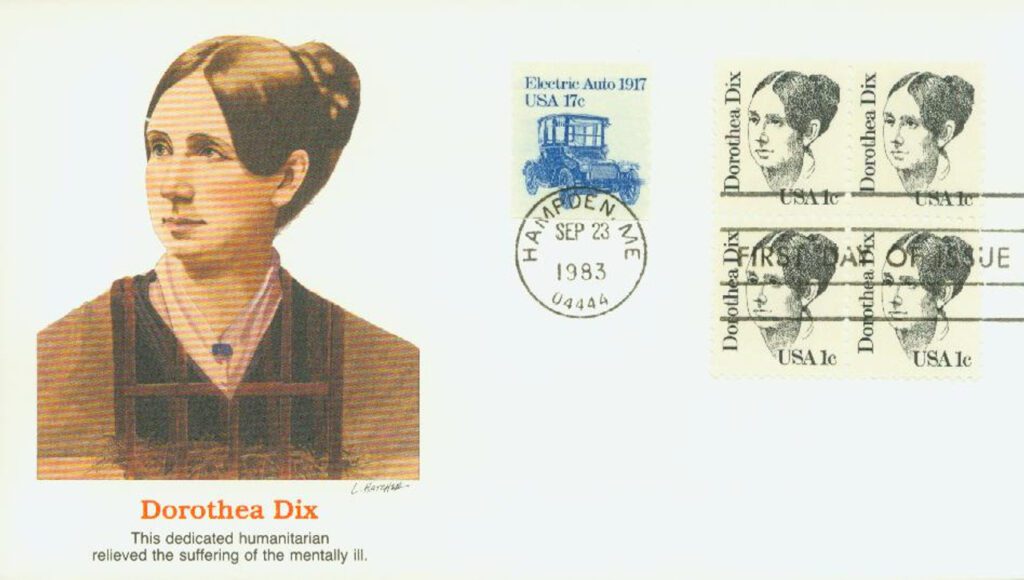Dorothea Lynde Dix was born on April 4, 1802, in Hampden, Maine. She spent much of her life improving and establishing new mental asylums. Dix also served as the superintendent of Army Nurses during the Civil War.
Dix was the oldest of three children. Her mother was ill and her father drank heavily, so when she was 12, she and her siblings went to live with her grandmother in Boston. By the time she was 14, Dix was teaching at an all-girls school in Worcester where she promoted ethical habits and taught natural sciences. Dix then opened her own school in Boston around 1821 where she taught the children of wealthy families. She also taught poor children in her grandmother’s barn.
Dix suffered from depression and developed health issues that forced her to stop teaching. She spent six years writing books. Among these was Conversations on Common Things, which was reprinted 60 times by 1869. Dix also wrote one of the first flower dictionaries in the US. She returned to teaching in Boston from 1831 to 1836, but suffered from a breakdown and was encouraged to go to Europe to find relief. While there, she visited institutions and met social reformers that inspired her to rally for the care of the mentally ill.
When she returned to the US in 1840, Dix launched an investigation into the care of the mentally ill throughout Massachusetts. She found conditions to be terrible, especially at the East Cambridge prison, where she also taught female prisoners. They didn’t receive the medications they needed and found mentally ill people in dark, bare cells and others locked up with dangerous criminals. In her resulting report, to the state legislature, Dix described people “in cages, stalls, pens! Chained, naked, beaten with rods, and lashed into obedience!” The legislature was moved by her report and subsequently passed a bill to improve the state mental hospital in Worcester.
Dix then set out to improve conditions around the country. Starting in New Jersey, then moving on to New Hampshire, Louisiana, Illinois, North Carolina, and Pennsylvania, she campaigned to improve existing mental institutions and establish new ones. In the 1850s, she proposed a land bill that would set aside millions of acres of federal land for the mentally ill. The bill passed both houses of Congress but President Franklin Pierce vetoed it because he felt social welfare should be up to the states. Dix then returned to Europe and continued her mission in Scotland, France, and Italy.
Beating out Dr. Elizabeth Blackwell for the position, Dorothea Dix was appointed to serve as the Union’s superintendent of Army Nurses in 1861. Dix set strict guidelines. Candidates had to be age 35-50, plain, and wear drab dresses. Jewelry and makeup were also forbidden in an attempt to shield them from exploitation from male doctors and patients. Dix feuded with nurses, doctors, and bureaucrats, but her non-partisan care for all wounded soldiers won her fans in the North and South. After Lee’s retreat from Gettysburg, “Dix nurses” cared for over 5,000 injured Confederates. The task called for Dix’s steely nature and organizational skills. Julia Susan Wheelock, one of Dix’s nurses, said “Though enemies, they were nevertheless helpless, suffering human beings.”
After the war, Dix continued her crusade, and also worked to improve the care of the disabled and prisoners. In 1881, she moved into the New Jersey State Hospital that she had founded years earlier. She spent the rest of her life there, continuing to correspond with people from around the world until her death on July 17, 1887. Over the course of her crusade, Dix founded 32 mental institutions and improved more than 100 others. Several institutions and wards were named in her honor as well as a crater on Venus and World War II transport ship.

| FREE printable This Day in History album pages Download a PDF of today’s article. Get a binder or other supplies to create your This Day in History album. |
Discover what else happened on This Day in History.






We need a Dorothea Dix to help the mentally ill homeless populations all over the United States. The neglect of these people is a scandal.
Do we have asylums any more, or are they all running around loose? Scary situation, yes its terrible, but some forward thinking would have been helpful. Yes, and let all illegal aliens vote!!!
Question, wondering. Is Fort Dix named for her …
Fort Dix, located in New Jersey, was established in 1917 as Camp Dix. It was named in honor of Major General John Adams Dix, a distinguished figure with an impressive background: Major General Dix served in the War of 1812 and the American Civil War. He held various significant positions, including U.S. Senator, U.S. Secretary of the Treasury, and Governor of New York.
Wow, a lot of accomplishments for the better care of those who could not have been heard or even noticed by a vast majority of most. I believe she accomplished her purpose that GOD had intended for her and did it well! I would have liked to have seen a more beautiful stamp issued to commemorate her accomplishments. Thanks again for the update.
He became an officer at fourteen.